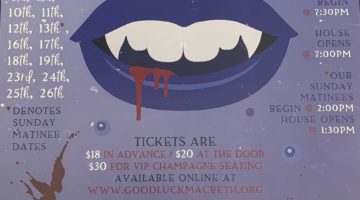
Bailey McCey/ Nevada Sagebrush
The cast of “The Showbiz Cabaret” prepares to bow at The Potentialist Workshop on Thursday, Sept. 1, 2016. The actors collaborated on writing and choreography for the play.
Last Thursday, Sept. 1, marked the first showing of “The Showbiz Cabaret,” a circus-themed play rife with high-energy acting and dancing. Opening to a full house, the play was performed spectacularly and was joyously applauded by the large audience. It ran for three days, with a steady turnout for each showing.
The play was written, directed and produced by UNR alumna, Keely Cobb. Cobb graduated from UNR last May with a bachelor’s degree in theater. “The Showbiz Cabaret” is Cobb’s first large production, stemming from a duet she wrote during her last semester at the university.
Performed at the intimate setting of The Potentialist Workshop on East Second Street, audience members were treated to an original local play filled with local artists.
“The Showbiz Cabaret” proved to be a new experience for Cobb, the cast and the audience alike.
“I had a little bit of directing experience, but I knew nothing about writing a show and I knew nothing about producing a show,” Cobb said.
The cast consisted of 10 members, seven of which were UNR students who all helped write dialogue and choreograph dancing.
Cobb focused the bulk of the play around the idea of fitting in rather than being yourself in the show business industry. Cobb expressed this theme most poignantly by writing the character Puppet/Silly Clown.
“I connect with [Silly Clown] because I am going into the theater and dance industry, and she faces the controlling aspect of the industry,” Cobb said, when describing her personal feelings about the play.
Puppet/Silly Clown’s struggles act as a criticism of the show business industry as a whole, specifically during the scene in which Controlling Clown literally controls her dancing. Losing yourself to fit in is one of those sad but true realities that everyone faces at one time or another. The use of a puppet written by a person just starting their career in the industry to convey this criticism creates a meta-narrative that lends itself to a textured story.
Beyond the critique of the performance industry is a light hearted play with a loose tone, much like that of a cabaret.
Feeling both improvised and erratic, the actors interacted with the audience members before and during the play.
Watch a short video about the play here:
As the play began, the Narrator/Crazy Clown took the stage and introduced the characters. Each actor seemed to fit with their respective roles, most likely due to their collaborative effort with Cobb. The result was a set of characters that didn’t feel unnatural.
The characters brought the play together with small quirks and interesting motivations, creating a flow between the story and the characters.
A wide variety of characters also brings a heightened level of connection with the audience.
“I want the audience to feel like they know the characters on stage, and to feel excited when the characters experience triumph, and to feel sad when they experience heartbreak,” Cobb said, when describing her hopes for the play.
The play is centered around 10 vignettes, each exploring different scenarios with the characters lenses. Keeping a swift pace, the play rolls through comedic highs as well as dramatic lows, all of which are supported by a score of music that feels both old-fashioned and contemporary.

Bailey McCey/ Nevada Sagebrush
Brandon Butler and Moriah Wegman act out a scene at The Potentialist Workshop on Thursday, Sept. 1, 2016. The two shared a scene at the latter half of the play.
One memorable scene is when Diva, played by local dancer Moriah Wegman, breaks free from the spotlight to be with Mr. Cellophane, played by UNR student Brandon Butler. This comes after Mr. Cellophane gives an impassioned monologue about unrequited love, which Butler himself wrote for the play.
The most notable part of the play, however, is the dancing. All of the vignettes incorporate dance in some way or another. The scenes were choreographed with playfulness and skill.
The end of the play is one of the most impressive scenes, with the entire cast interacting and using the whole stage to bring the story around.
The bombastic style of “The Showbiz Cabaret” really lends itself to the overall experience. The play ran for about an hour, but it felt like 20 minutes due to the high energy involved in each scene. The vignette style made for a unique structure and setting for the characters, and it kept the play both light hearted and dramatic.
“The Showbiz Cabaret” is a shining example of local collaborative art, featuring local talent and production. Cobb’s writing and directing was a great framework for all those involved to be creative and natural.
Cobb is currently working with UNR’s theater department as dance captain for the upcoming production of “Music Man” this fall. She anticipates writing another, more personal piece that she wishes to perform at dance festivals around the country.
Blake Nelson can be reached at jsolis@nevadasagrush.unr.edu or on Twitter @b_e_nelson.












